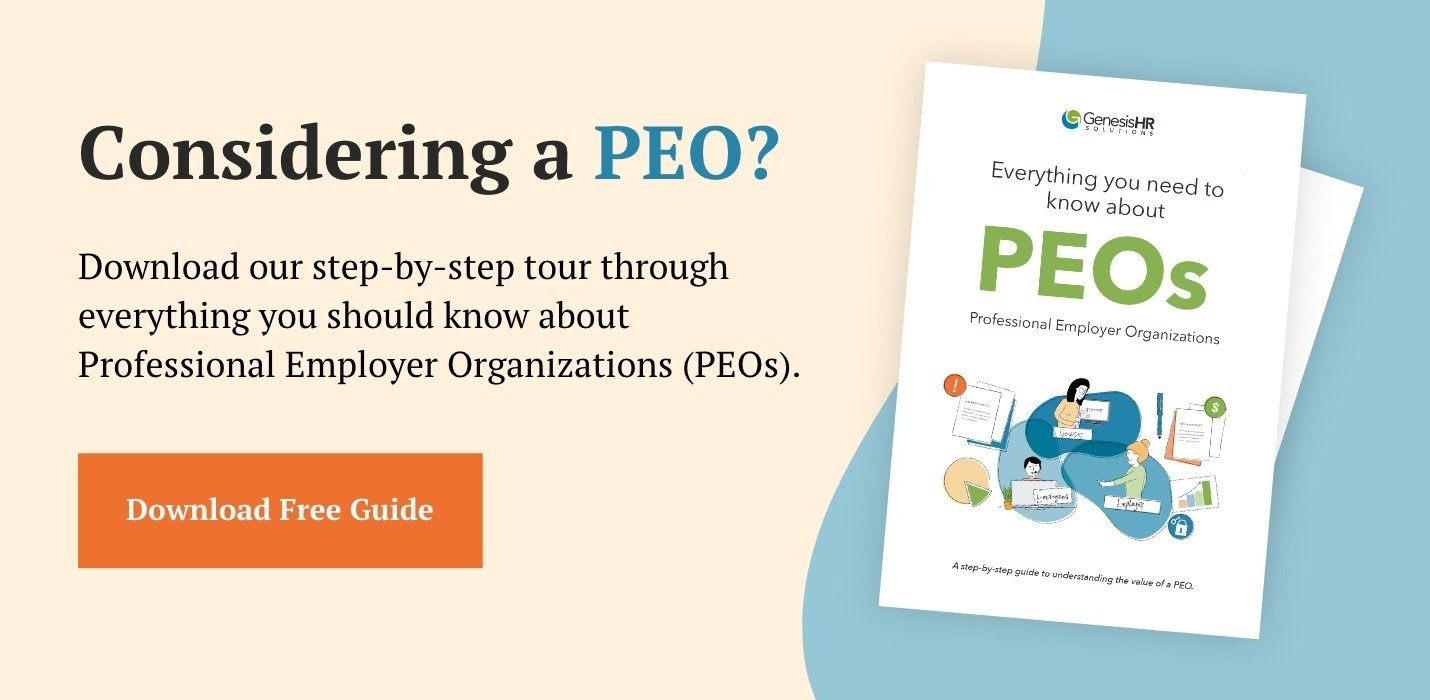For many small businesses, the struggle to compete with larger companies for talent is an uphill battle—particularly when it comes to benefit offerings. While you know recruiting and retention is important, you may not be sure if the benefits you offer are a selling point to your potential employees.
This list of benefits (and their definitions) can help; compare the 16 types we’ve listed here to what you currently have available, and see if you’re offering things prospective employees are really looking for. At the end of this article, we’ll explain how a professional employer organization (PEO) can help you select, negotiate, and administer best possible benefits for your company.
16+ types of employee benefits you should consider
There are four major types of employee benefits many employers offer: medical insurance, life insurance, disability insurance, and retirement plans. Below, we’ve loosely categorized these types of employee benefits and given a basic definition of each.
Medical
1. Medical Insurance
Medical insurance is likely a no-brainer—it’s one of four major types of benefits most employers offer. It covers things including hospital and doctor visits, surgeries, and prescriptions. Employers usually cover a portion of this premium.
2. Dental Insurance
Most dental policies emphasize prevention and diagnostics, typically covering annual exams and cleanings, X-rays, and sometimes fluoride treatments. (Bankrate.com)
Onboarding new hires? Here’s exactly what you need to do to retain them.
3. Vision Insurance
Vision insurance is designed to help your employees cover and budget for ongoing vision care expenses like routine eye exams, prescription glasses, and contact lenses.
4. Flexible Spending Account (FSA)
According to Healthcare.gov, a Flexible Spending Account (also known as a flexible spending arrangement) is a special account employees put money into that they use to pay for certain out-of-pocket health care costs. Employees don’t pay taxes on this money, which means they save an amount equal to the taxes they would have paid on the money you set aside. As an employer, you may make contributions to your FSA, but you aren’t required to. The amount you elect must be used in that plan year.
5. Health Savings Account (HSA)
Sometimes referred to in the same conversation as an FSA, an HSA is a savings account that lets employees set aside money on a pre-tax basis to pay for qualified medical expenses. Using untaxed dollars in an HSA to pay for deductibles, copayments, coinsurance, and some other expenses can lower overall health care costs. An HSA can be used only if employees have a qualified High Deductible Health Plan (HDHP). HSA funds roll over year to year if employees don’t spend them. An HSA may earn interest, which is not taxable. (Healthcare.gov)
6. Health Reimbursement Account (HRA)
Health Reimbursement Accounts (HRAs), sometimes called Health Reimbursement Arrangements, are group health plans funded by you, the employer, from which your employees are reimbursed tax-free for qualified medical expenses up to a fixed dollar amount per year. Unused amounts may be rolled over to be used in subsequent years. Employers fund and own accounts. (Healthcare.gov)
7. Cancer Insurance
Cancer insurance is an insurance policy that pays only after cancer has been diagnosed. Cancer insurance is supplemental insurance, and most types pay policyholders a lump sum upon diagnosis with a covered cancer, while others offer supplemental payments for healthcare costs. (MAACenter.org)
8. Critical Illness Insurance
Critical Illness insurance, also referred to as Critical Care insurance or Critical Illness coverage, provides a lump-sum cash benefit to help cover expenses associated with a qualifying serious illness. (UHC.com)
9. Hospital Insurance
Hospital insurance is health insurance for hospital costs. The employee must pay a monthly fee for private insurance. Federal or state employees do not. (TheLawDictionary.org)
Life
10. Life Insurance
A life insurance policy is a contract with an insurance company. In exchange for premium payments, the insurance company provides a lump-sum payment, known as a death benefit, to beneficiaries upon the insured’s death.
11. Accidental Death & Dismemberment Insurance
Accidental death and dismemberment, according to NerdWallet, ”pays out if you die or get seriously injured in an accident, such as a car crash. The payout for injuries is limited to cases where you lose a limb or finger; lose sight, speech or hearing; or suffer paralysis or coma as the result of an accident. The coverage overlaps a little with life insurance and disability insurance, but it shouldn’t be considered as a replacement for either one.”
Disability
12. Disability Insurance
Disability insurance pays a portion of an employee’s income if they can’t work for an extended period because of an illness or injury. There are two types of disability insurance you can offer: short-term and long-term. This NerdWallet article breaks down the differences between short-term disability insurance and long-term disability insurance.
13. Accident Insurance
Accident insurance helps employees pay for the medical and out-of-pocket costs that you may incur after an accidental injury. This includes emergency treatment, hospital stays, and medical exams, and other expenses they may face, such as transportation and lodging needs. (eHealthinsurance.com)
Retirement
14. 401(k) & 403(b) Retirement Plans
A 401(k) or a 403(b) is a retirement plan named for the section of the tax code that governs it. (WSJ). A 401(k) plan can be an important tool for a small business to attract and retain employees. When administered correctly they should not pose much of a risk to the Plan Sponsor, but we have seen and heard too many stories of Small Business Owners getting in trouble for issues they could have avoided. It is critical to make sure you are partnering with an advisor who specializes in 401(k). There is risk involved in sponsoring a 401(k) Plan—we discuss this in detail in this article.
There are several other types of retirement plans to consider, including Simple IRA, Roth 401(k), and more.
Additional Benefits To Consider
15. Employee Assistance Program (EAP)
According to SHRM, “An employee assistance program (EAP) is a work-based intervention program designed to identify and assist employees in resolving personal problems (e.g., marital, financial or emotional problems; family issues; substance/alcohol abuse) that may be adversely affecting the employee’s performance.”
15. Pet Insurance
Pet insurance helps cover the costs of veterinary treatment in the event of illness or injury. Some policies will also pay out if a pet dies, is lost or stolen, causes injury to a third party, or damages a third party’s property.
Aside from the 16 benefits listed above, employers interested in recruiting and retaining the best talent should consider offering benefits that include the following:
- Time-off benefits.
- Phone and internet reimbursement.
- Health and wellness benefits, including gym memberships or reimbursement, wellness programs, etc.
- Scholarships or tuition reimbursement.
Partnering With A PEO Simplifies Your Employee Benefit Planning & Administration
Most employers want to provide their employees with the best possible benefits; however, the selection, negotiation, and administration process is often overwhelming for already-busy owners. That’s where professional employer organizations (PEOs) like Genesis HR Solutions come in. Genesis eliminates many of the hassles associated with benefits administration, and even helps improve your benefit offerings. As a Genesis partner you gain access to:
Large Group Health Insurance Plans
Most small businesses don’t have access to (or simply can’t afford) the multitude of options offered to large companies. When your nonprofit partners with a PEO it becomes more competitive with larger companies. By joining our PEO, you immediately have access to “large group” medical offerings like Fortune 500 benefits, Blue Cross Blue Shield of Massachusetts health insurance, and more. This PEO partnership evens the hiring playing field between your small business and large corporations, and allows you to attract better talent. Read more about the benefits packages and insurance offerings you could get if you partner with Genesis.
A Savvy Rate-negotiating Partner
It takes time to deal with the selection, bidding, negotiations, renewals, and other back-and-forth associated with insurance. Let us do the heavy lifting for you. We work with our broker and underwriting firm to figure out how rate increases may impact clients, and then go client-by-client to negotiate rates and bidding. Our expertise in this area means you can trust us to handle these conversations, giving you time back to attend to your core competencies.
An Experienced Team
Benefits administration is a headache for business owners, who often don’t know where to begin. We take care of the beginning, middle, and end of the benefits administration process, including:
- Annual renewals
- Shopping for new partners and comparing plans
- Contract negotiations
- Contribution strategies for employers
- Two-step open enrollment process for employers and their employees”
- Documenting employee benefit elections
- Making sure payroll deductions are correct
Second-to-none Customer Service
Many of our clients note that one distinct advantage of choosing Genesis is the way we offer our services: We’re responsive, real-life New Englanders who know your name and company. To us, you’re more than just a client—We know you and you know us, which allows us to take a more personalized approach to meeting your needs.
Get the best benefits—without the hassle—by partnering with a PEO.
PEOs like Genesis handle everything from insurance vendor relationships and annual renewals to monthly invoices and claim resolutions , so you can spend time doing things you love to do. An added bonus: Our oversight helps protect you from potentially being overbilled by vendors.
As competition for finding and keeping talented employees grows, it’s imperative that small business owners and leaders are offering the best possible benefits to employees. When you partner with a PEO, your company can get benefits that put you in the ring with larger companies—without going over budget. To see how we can help you improve your company’s benefit offerings, contact us to schedule a meeting.




